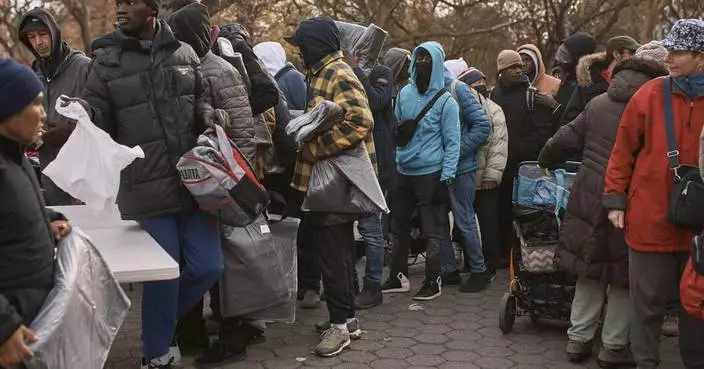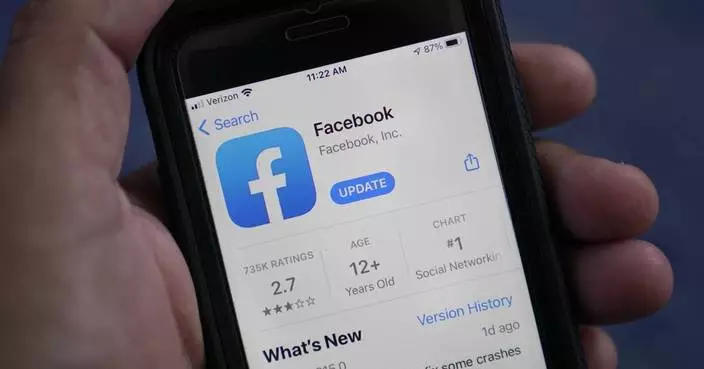Facebook is adding a "sleep" mode to its Messenger Kids service to let parents limit when their kids can use it.
It's the latest concession that tech companies are making as critics question whether they should be targeting kids at all. Among their chief concerns: The effects on kids are not yet known, and companies might not have children's best interests at heart when tech for kids is such a lucrative market.
Rather than kill the services completely, as some critics want, Facebook, Amazon and Google are mostly tinkering at the edges. That leaves open the underlying questions of whether their products truly serve a need for the youngest set and if they are good for them.
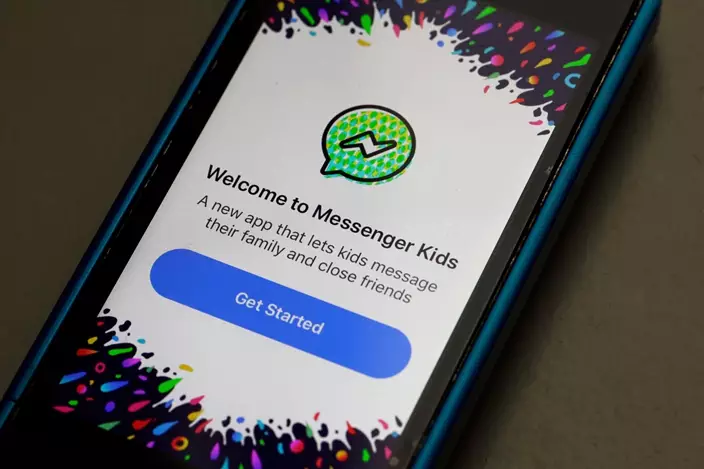
FILE- In this Feb. 16, 2018, file photo, Facebook's Messenger Kids app is displayed on an iPhone in New York. Facebook is adding a “sleep” mode to its Messenger Kids service so parents can limit how much time children spend on it. (AP Photo/Richard Drew, File)
Here's a look at the changes announced this week:
___
FACEBOOK'S MESSENGER KIDS
In December, Facebook created a kids-friendly version of its Messenger app. It has no ads and gives parents plenty of controls over whom their children can chat with. The thinking was that while the regular apps are designed for people 13 or over, younger kids were on it anyway. Facebook saw Messenger Kids as a way to give the younger set a safer option.
— The changes: Parents can now specify the times kids aren't allowed on — either as a one-time restriction or something recurring, such as after 9 p.m. every school night. While the app is in sleep mode, kids will get a message when they open it telling them so, and they won't be able to use it.
— The shortcomings: Critics say that Messenger Kids isn't responding to a need, but rather creating one. "It appeals primarily to children who otherwise would not have their own social media accounts," states a letter signed by 100 child development experts and advocates. Merely offering time controls falls short of killing the app completely.
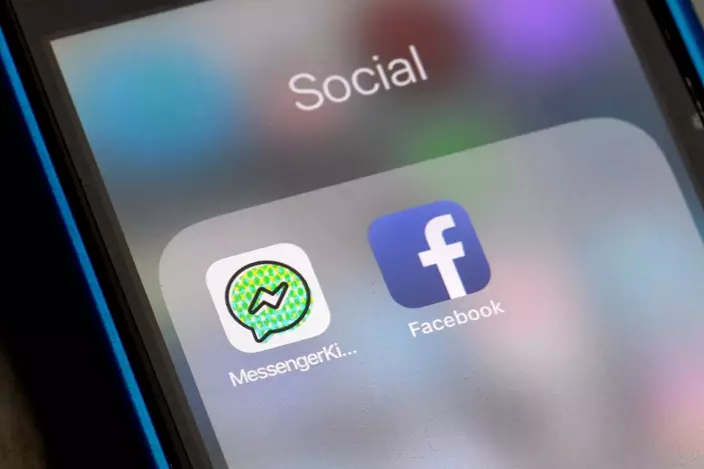
FILE- In this Feb. 16, 2018, file photo, Facebook and Facebook's Messenger Kids app icons are displayed on an iPhone in New York. Facebook is adding a “sleep” mode to its Messenger Kids service so parents can limit how much time children spend on it. (AP Photo/Richard Drew, File)
___
YOUTUBE KIDS
Since 2015, the Google-owned service has had a child-oriented app, YouTube Kids, described as a "safer" experience for finding "Peppa Pig" episodes or user-generated videos of people unboxing toys.
Nonetheless, the company has been under fire for not vetting out computer-generated, sometimes-disturbing video, such as your favorite cartoon characters having painful dental surgery — or worse.
The nonprofit Campaign for a Commercial-Free Childhood has also asked the Federal Trade Commission to investigate whether YouTube's data collection and advertising practices violate federal child privacy rules.
— The changes: YouTube said this week that it is overhauling its kids app so parents can limit video to those vetted by humans, rather than computers. With this option, kids can watch only a selection of children's programming such as "Sesame Street" and PBS Kids.
— The shortcomings: The old automated system is on by default, meaning parents need to actively choose the human-only option. And YouTube is continuing to show ads on its kid-focused service.
It also doesn't help that many kids (with or without their parents) use the main YouTube site for video, meaning they miss out on both human and automated controls for kids.
___
AMAZON'S ALEXA
Sure, it's fun to ask Amazon's Alexa voice assistant to fart — as many kids have discovered after parents buy an Alexa-enabled Echo speaker. But parents and childhood experts have been wondering what effects smart speakers may have on young kids, who may not quite understand whether Alexa is human and maybe learn from barking orders at her that barking orders is OK.
— The changes: Alexa will soon thank kids for shouting out questions "nicely" if they say "please," the online retail giant announced Wednesday . The new response is part of a kid-friendly update that's coming next month, giving parents more control over the voice assistant. Adults can also set Alexa to go silent at bedtime or block music with explicit lyrics.
— The shortcoming: This may be appeasing parents just enough to buy more Amazon products. After all, the company did not get to where it is today by missing out on new business opportunities. Amazon said it will now sell an $80 Echo Dot aimed at children, complete with colorful cases and a two-year warranty (regular Echo Dots are $50).
WASHINGTON (AP) — The company responsible for a global recall of sleep apnea machines will be barred from resuming production at U.S. facilities until it meets a number of safety requirements, under a long-awaited settlement announced Tuesday by federal officials.
Philips will be required to overhaul its manufacturing and quality control systems and hire independent experts to vet the changes, according to a court order announced by the U.S. Department of Justice. The company must also continue to replace, repair or provide refunds to all U.S. customers who got the defective devices, the department said.
The action is a major step toward resolving one of the biggest medical device recalls in history, which has dragged on for nearly three years.
Most of the devices recalled are continuous positive airway pressure, or CPAP, machines. They force air through a mask to keep mouth and nasal passageways open during sleep. Left untreated, sleep apnea can lead to dangerous drowsiness and increased risk of heart attack.
Philips has recalled more than 5 million of the machines since 2021 because their internal foam can break down over time, leading users to inhale tiny particles and fumes while they sleep. Efforts to repair or replace the machines have been plagued by delays that have frustrated regulators and patients in the U.S. and other countries.
Lawyers for the federal government alleged that the company failed to comply with good manufacturing practices needed to ensure device safety. The company did not admit to the allegations, according to the court filing.
“This office, the FDA and our partner agencies are committed to holding manufacturers accountable when they violate the law and put the public at risk," U.S. Attorney Eric Olshan said in a statement.
Under the legal agreement, Philips must hire independent auditors to create a plan for fixing its manufacturing problems and for monitoring problems with the sleep devices. The plan must then be approved by the Food and Drug Administration. The experts must also certify that new foam selected by the company meets FDA safety standards.
Jeffrey Reed, of Marysville, Ohio, experienced persistent sinus infections and two bouts of pneumonia during the seven years he used a Philips machine.
“I worry about my long-term health,” Reed said. “I used this machine for years and no matter what money I might get out of this, what’s going to happen?”
Reed received a newer Philips device after returning his old machine, but he doesn't like to use it, preferring a competitor's device.
“I don’t trust the company,” Reed said. “I don't want to use it.”
Reed is one of more than 750 people who have filed personal injury lawsuits against the company over the devices. Those cases have been consolidated in a federal court in Pennsylvania.
Similar lawsuits are pending in Canada, Australia, Israel and Chile, according to the company.
The Dutch manufacturer announced in January it had reached a tentative agreement with the FDA and the Department of Justice. But U.S. regulators wouldn't confirm the deal at the time because it had not yet been reviewed by a federal judge.
A company spokesman said Tuesday the agreement provides "a roadmap of defined actions, milestones, and deliverables to meet relevant regulatory requirements,” in an emailed statement. He noted that Philips will still be able to export some machines for sale outside the U.S.
The FDA’s website warns patients that the risks of ingesting the sound-dampening foam could include headache, asthma, allergic reactions and more serious problems.
An FDA inspection of Philips’ Pennsylvania offices in the fall of 2021 uncovered a spate of red flags, including emails suggesting the company was warned of the problem with its foam six years before the recall.
Between 2016 and early 2021, FDA found 14 instances where Philips was made aware of the issue or was analyzing the problem. “No further design change, corrective action or field correction was conducted,” the FDA inspectors repeatedly noted.
In 2022, the FDA took the rare step of ordering Philips to step up its outreach to customers about the recall including “clearer information about the health risks of its products.” At the time, the agency estimated only about half the people in the U.S. with affected machines knew they had been recalled.
Customers trying to obtain refunds or new or refurbished devices from the company have reported long delays.
The Associated Press Health and Science Department receives support from the Howard Hughes Medical Institute’s Science and Educational Media Group. The AP is solely responsible for all content.
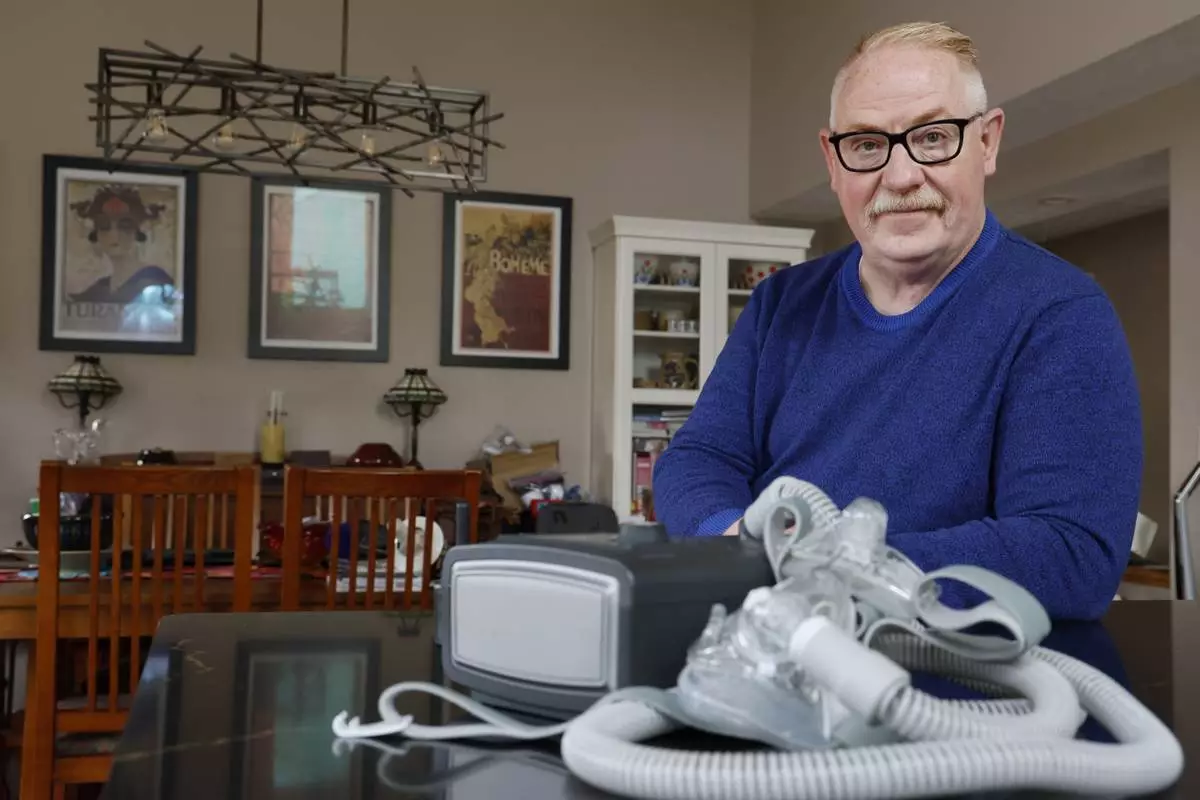
FILE - Jeffrey Reed, who experienced persistent sinus infections and two bouts of pneumonia while using a Philips CPAP machine, poses with the device at his home, Oct. 20, 2022, in Marysville, Ohio. The company responsible for a global recall of sleep apnea machines will be barred from resuming production at U.S. facilities until it meets a number of safety requirements under a long-awaited settlement announced Tuesday, April 9, 2024 by federal officials. (AP Photo/Jay LaPrete, file)






